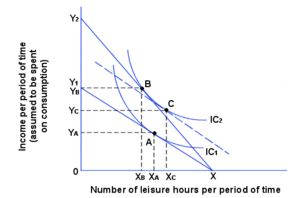The interventions to "cure" high unemployment _will_ be Keynesian. Because every other race of economists pretends that high unemployment is not a problem. I am exaggerating, but only a little bit.
I would not mind a "better" form of Keynesian, but those who are in the best position to provide those improvements are too busy pretending that high unemployment is not a problem. Or that businesses have techniques to turn marginal employees into highly productive employees, and they will use those techniques instead of the tried and true methods of raising productivity and shedding employees at the same time. Because of the time wasted on these fallacies, we will get the old Keynesian cure from the old Keynesians, because the Keynesians are immune to these particular fallacies (being too busy with their own fallacies).
The interventions to "cure" high unemployment _will_ be Keynesian, whether I like it or not, whether anyone likes it or not. Prepare accordingly - labor legislation in the United States _will_ greater resemble Continental Europe - because the current and expected social costs of high unemployment are very real (including lost taxation and lost consumer demand, besides criminality induced by idleness).
> I agree that high productivity growth is very good news and that it portends increases in hiring.
Running a business, if I have productivity growth, and, for whatever reason, I wanted productivity to go back down, the fastest way to do it would be to hire more employees.
I am not supposed to admit this, but I feel compelled to be honest. Higher unemployment and higher productivity growth have no demonstrated inverse relationship.
When the social costs of unemployment come home to roost, we will see legislation to enforce lowered productivity. I can complain about it, but it would be foolish to not see it coming. Somehow, I will be compelled to hire more employees, and productivity will go down. Because employees bring with them the burden of mandated entitlements and the burden of their own inner sense of entitlement. Like it or not, it is foolish for me to pretend otherwise.
> What people are calling a "jobless recovery" is what I would call the market taking a long time to solve the job assignment problem.
The market has solved the job assignment problem by not hiring. And productivity has increased. During the 'good times', the market was more tolerant of low productivity - now less so. Businesses act accordingly. Because, at this time, businesses are not compelled to bare a share of the current and expected social costs of high unemployment (including lost taxation and lost consumer demand, besides criminality induced by idleness).
"
A depressing follow-up to a reply to my comment:
> I disagree with manuelg' first comment regarding legislation to compel more utilization of human capital - that's been attempted by, among others, the Luddites, the Wobblies, and the Communists.
I didn't say it would work as advertised! ;-) It will "work" to reward a particular voting block, as one would expect. High unemployment provides the "cover".
> ... the workforce will either develop or rediscover markets that require human capital (R&D, personal service) or the supply will re-train to enter other labor markets a la buggy whip makers and farmers
Or neither. New positions never opening up at an adequate rate is a distinct possibility. Take R&D - why not use 40 Indian PhD's to do the work of 60 US PhD's? Take personal service - a goodly portion of the work of a personal assistant can be done remotely - again employing someone without the same expectation of quality of life and compensation in a place with a much lower cost of living.
The majority of the work will be of poor quality, but the cost savings will be compelling. Like the craftsmanship of a pocket-watch compared to the time display on a plastic cell phone. People spend a smaller fraction of their income on telling the time (pennies out of the cost of the phone and service), and lose daily contact with items to true quality, and that prior level of quality becomes a boutique luxury item, and employs far fewer people.
> ...re-train to enter other labor markets...
It may in fact be easier to "retrain" a US worker to become a ethnic Chinese worker (chopstick skills, walking stooped to pass through lowered doorways, reading/writing Chinese letter-forms) than it would be to retrain a US worker to have the skills and sense of responsibility and lack of sense of entitlement that the new employment positions opening up require. Look at the malaise of Japan's labor economy as the positions disappeared for lifetime employment by a single employer, never to return. Even after years of a desperate situation, it is not 100% certain that a human will change their attitudes to match a new reality.
Not to put too fine a point on it.


![Reblog this post [with Zemanta]](http://img.zemanta.com/reblog_e.png?x-id=38dbc02a-b57b-44c7-8b92-ecb74f835e8e)
No comments:
Post a Comment